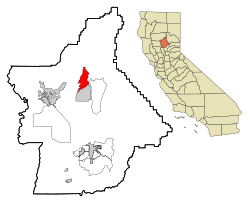Magalia, California facts for kids
Quick facts for kids
Magalia, California
|
|
|---|---|

Location in Butte County and the state of California
|
|
| Country | |
| State | |
| County | Butte |
| Area | |
| • Total | 14.019 sq mi (36.309 km2) |
| • Land | 14.015 sq mi (36.298 km2) |
| • Water | 0.004 sq mi (0.011 km2) 0.03% |
| Elevation | 2,333 ft (711 m) |
| Population
(2020)
|
|
| • Total | 7,795 |
| • Density | 556.03/sq mi (214.685/km2) |
| Time zone | UTC−08:00 (PST) |
| • Summer (DST) | UTC−07:00 (PDT) |
| ZIP Code |
95954
|
| Area code(s) | 530 |
| FIPS code | 06-45120 |
| GNIS feature ID | 1659035; 2408161 |
Magalia (formerly called Butte Mills and Dogtown) is a community in Butte County, California, United States. It is an "unincorporated community," which means it does not have its own city government. Instead, it is managed by the county. In 2010, about 11,310 people lived in Magalia.
Contents
A Look Back at Magalia's History
Magalia started as a busy mining camp after the famous California Gold Rush in 1849. It was first named Mountain View. In 1850, a dog breeding business began there, leading to the name Dogtown.
A post office opened in 1857, which was shared with a nearby settlement called Mill City. Eventually, Dogtown and Mill City joined together. In 1861, the community's name was changed to Magalia. This name comes from a Latin word that means "cottages."
The Famous Dogtown Nugget Discovery
On April 12, 1859, something amazing happened near Magalia. At a hydraulic mine called the Willard Claim, a huge gold nugget was found. This nugget weighed 54 pounds (about 20 kilograms)! At the time, it was the largest gold nugget ever discovered in the world. It was named the "Dogtown Nugget" and made the town very famous.
The 2018 Camp Fire Event
In November 2018, Magalia was greatly affected by a large wildfire known as the Camp Fire. This fire caused a lot of damage to the community. Sadly, the Butte County Sheriff's Department reported that at least seven people died in Magalia during this event. Some people found safety at a local Baptist church, which was along the only way to escape north of the ridge.
Magalia's Geography and Natural World
Magalia covers an area of about 14.1 square miles (36.3 square kilometers), and all of it is land. The area is home to many different kinds of plants and animals.
Local Wildlife and Plants
You can find various mammals here, such as Black tailed deer, raccoons, and grey squirrels. There are also many amphibians, like the Rough-skinned Newt. This newt's southern range in California is close to Magalia. The soil in Magalia is mostly a deep reddish-brown loam. This rich soil helps support a forest filled with tall incense cedar and bull pine trees.
Magalia's Climate Overview
Magalia has a type of weather called a hot-summer Mediterranean climate. This means it has hot, dry summers and mild, wet winters. On climate maps, this is often shown as "Csa."
Magalia's Population Information
Population in 2010
The 2010 United States Census counted 11,310 people living in Magalia. Most of the people were White (91.9%). There were also smaller numbers of African American, Native American, Asian, and Pacific Islander residents. About 6.8% of the population identified as Hispanic or Latino.
There were 4,825 households in Magalia. Many of these households (51.5%) were married couples living together. About 25.2% of households had children under 18. The average household had 2.34 people.
The population included people of all ages. About 19.1% were under 18 years old, and 23.7% were 65 years or older. The average age in Magalia was 49.0 years.
Most people (77.0%) owned their homes, while 23.0% rented.
See also
 In Spanish: Magalia para niños
In Spanish: Magalia para niños


